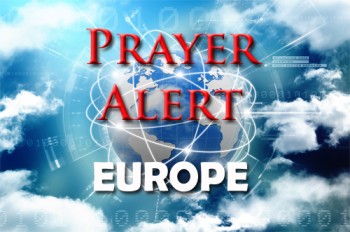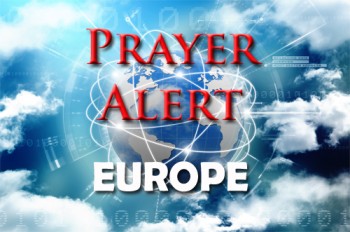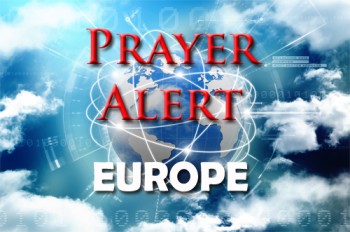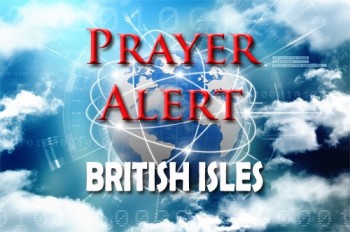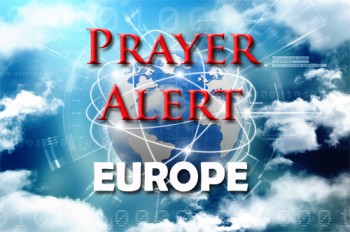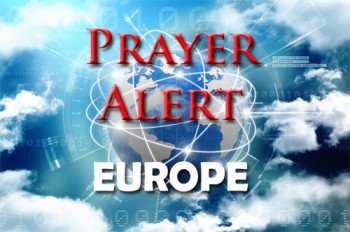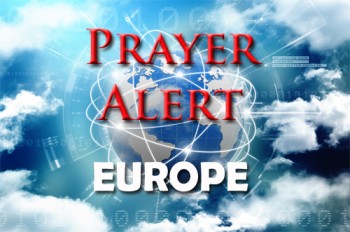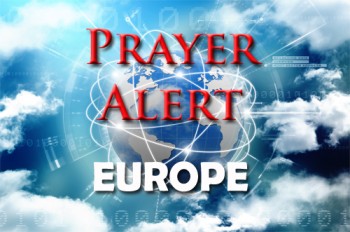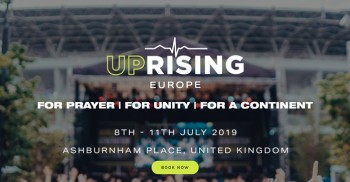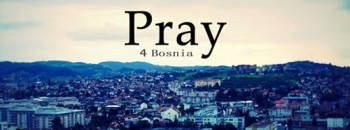Displaying items by tag: Europe
Spain: worst wildfire in twenty years
On 27 June, amid a Europe-wide heatwave, a forest fire in Catalonia raged out of control, despite the efforts of hundreds of firefighters working through the night. It broke out on 26 June, and had destroyed over 10,000 acres by the next morning. Already thirty people have been evacuated from farmhouses, and the regional government warned that it could eventually devour 50,000 acres. It may have been caused by manure in a farm generating enough heat to explode and produce sparks. Much of Europe is gripped in a record-breaking heatwave that could send thermometers above 40 C (104 F).
France: healing in a foreign land
Greater Europe Mission (GEM) write: ‘We met Malik in a French square where refugees hang out. Originally from Senegal, Malik had travelled through Mali, Algeria, Syria, Italy and then France before we met him. He only had the clothes on his back and whatever was in his backpack. We took him to get some food, but he did not understand our English. When the local pastor translated, Malik’s face lit up in a painful smile. He had a horrible toothache. A few days later we invited him to come along as we visited a Jewish neighborhood. We visited a Jewish bakery owner, and read Isaiah 53 together. Not long after this he prayed a prayer of salvation. Malik being befriended was a picture of disciples making disciples who make disciples. It was the best training Malik could receive after accepting Christ into his life.’
EU: candidate to succeed Juncker
At the time of writing European leaders are trying to agree on a compromise EU leader after political groups failed to unite behind a candidate to replace Jean-Claude Juncker in Europe’s top job. Following the elections in May, nobody has won united support from the four mainstream parties to become president of the EU’s executive arm. Onlookers are calling it a ‘big fight’ between Europe's political groups, leaders, and institutions. Other vacancies to be filled include speaker of the European parliament, which will sit for the first time on 2 July, and foreign policy chief. The final nominees must have the backing of least 21 of the 28 EU leaders and a majority in the 751-member parliament. National leaders want to control the process and allocate the most senior jobs in a way that balances men and women, east and west, small countries and large.
Worship and prayer initiative
Celtic Christianity once flourished in this nation. Spiritual wells were established and God’s Spirit flowed, bringing renewal and revival. The wells are still there today - underground, but blocked and covered over. World Horizons wants simultaneous groups to worship and pray at all the major spiritual wells of the past, asking God for the living water to rise up again! This is not just a UK event, it will be happening all over Europe. On Friday 21 June we will thank God for all his wonderful works over 2000 years. The next day we can ask him to send new life to these places again today - reopening ancient wells as Isaac did. On 23 June, ask him to send revival to the whole of Europe! Can you gather a group to worship and pray at a spiritual well near you? Was there a saint or powerful preacher like Wesley, or a monastery? If you feel called to take part please contact
Russian journalist falsely accused
Moscow police had detained Ivan Golunov, an anti-corruption journalist, for alleged drug offences. However, they had to drop charges against him after his arrest caused displays of support from other Russian journalists and cultural figures, 25,000 people expressing their disgust on Facebook, and a threatened protest march. Police involved in the case were removed from duty pending investigations, and President Vladimir Putin will be asked to dismiss more senior personnel. The Kremlin admitted that ‘mistakes had possibly been made’. Forensic tests did not detect Ivan’s fingerprints on the drugs purportedly seized from his home, neither was there any trace of drugs in his urine or on his fingers. Photographs supposedly showing a drug lab at his flat were later deleted after a policeman admitted they were taken at a different location and bore no relation to the journalist. Human rights groups said police in Russia often plant drugs on suspects.
Albania: president cancels elections
Protesters were met with tear gas and flares on the streets of Tirana, after Albania’s president Ilir Meta cancelled the 30 June elections. He cited political tensions in the country, stating that circumstances do not provide the necessary conditions for true, democratic, representative and all-inclusive elections. The opposing centre-right Democratic Party, led by Lulzim Basha, have held weeks of protests aimed at forcing the prime minister to stand down. They accuse him of links to organised crime and vote-rigging. The United States and the EU are urging protesters to disavow violence and take part in dialogue with government representatives to resolve the political crisis. The EU has criticised some violent tactics used by protesters. Smoke bombs and firecrackers outside parliament were met with tear gas. Mr Basha has urged continuing protests until Mr Rama steps down.
Germany: Two prayer requests
With the tremendous growth in what is now medically possible, organ donation raises many questions from a Christian-ethical point of view. Our society urgently needs to ask God for guidance and leadership in these increasingly far-reaching questions of life and death. The German parliament will discuss and vote on organ donation proposals in the autumn without a party whip. We have been asked to pray for a God inspired and guided debate on how parliament should proceed with the organ donation question. Secondly, Germany has about twenty large and influential criminal family clans, with their fingers in many pies, creating complex lawless challenges across the nation.
Ukraine: New President’s Brussels trip
Ukraine has deep-seated corruption, economic challenges, and conflict with Russia-backed militants in Donetsk and Luhansk resulting in 13,000 deaths since 2014 when Russia seized control of Ukraine's Crimean Peninsula. Ukraine’s new president, Volodymyr Zelenskiy is a popular comedian with no political experience. He has called on the EU to step up sanctions against Russia ‘to get peace back in Ukraine’. Zelenskiy said that under his leadership Ukraine will continue to pursue EU integration, calling it ‘an assurance of the independence of the Ukrainian state, the welfare of the Ukrainian people, and the accelerated economic and technological growth.’ As the ‘Bible Belt’ of the former Soviet world, Ukraine’s Church has a history of persecution. Freedom of religion is improving, but is not yet protected in both law and practice. Leadership training and direction are greatly needed among Christians. May followers of Jesus arise as messengers of His hope for the future. See
United Prayer Rising Europe – 8-11th July 2019
51 Nations gathering – For Prayer, For Unity, For a Continent.
United Prayer Rising - Europe is a prayer and worship gathering happening this summer at Ashburnham Place in Sussex, UK bringing together people from all over Europe to contend for an awakening amongst the next generation. We believe God is raising up an army of passionate worshippers who will pray together to see their continent saved. This is God’s time for Europe!
UPRising Europe is part of the global UPRising movement birthed out of the World Prayer Assembly in 2012 in Indonesia. The first UPRising event was held in Seoul, South Korea in July 2016. Since then, there have been UPRising events in the Philippines, South Africa, Mongolia, Bolivia, Malaysia, Canada, Chile and Jakarta, Indonesia.
We are excited to now host an Uprising event for the continent of Europe. This is such a critical time for the continent – much is being shaken whilst God is stirring the hearts of young people for radical prayer and mission.
The backbone of UPRising Europe will be 72 hours of non-stop worship and prayer led by worship teams from all over Europe. These are the grassroots, passionate worship and prayer leaders who are faithful to where God has placed them and willing to contend for Europe.
Out of this will flow prayer and intercession for Europe, with inspiration from speakers in our main sessions. We will be hosting practical seminars equipping young people in a lifestyle of prayer, fasting and evangelism. Finally we will be commissioning people to take this fire back to their nations.
Uprising Europe will be from the 8th to 11th July 2019 at Ashburnham Place, Battle, East Sussex. We want to invite anyone with a heart for Europe and the next generation to come and join us. Ashburnham Place, a retreat and conference centre, is set in beautiful grounds with lakes and woodlands. You can come and camp, or stay in the main house.
JJ Waters, Director of UPRising Europe said, “Following God’s lead, we are incredibly excited to gather together people from every nation in Europe to contend for an awakening amongst the next generation. This is such a critical time for Europe – God is moving powerfully but we know there is so much more to come. He is stirring the hearts of young people for radical prayer and missions, in what is now one of the most unreached continents on earth. Now is the time to come together from different nations, across denominations, honouring fathers and mothers, and to worship and pray for a mighty move of God in Europe.”
The ticket price for this event is generously subsided to make it affordable for delegates from across the continent. The UPRising Europe team would welcome offers of sponsorship from Churches, organisations and individuals who would like to sow into this event, for Europe.
Further details about the event, tickets, pricing or sponsorship can be found on our website https://www.uprisingeurope.org/ or please email us at This email address is being protected from spambots. You need JavaScript enabled to view it..
Uprising Europe is working with partners including YWAM, Burn 24-7, the World Prayer Centre, Ashburnham Place, Elim Prayer, Maranatha, Crosswinds Prayer Trust and Interprayer UK. Overseeing, supporting and endorsing the United Prayer Rising Europe event are Ian Cole of the World Prayer Centre, Birmingham, UK and Brian Mills of Interprayer, UK. They are both respected elders of the movement for prayer in the UK and worldwide.
Bosnia: Prayer for the Church
Churches Led by the Holy Spirit - Before Jesus went up to heaven, he told his disciples to wait in Jerusalem for the promise of the Father - the Holy Spirit. They did, and it was by the power of the Spirit that the very first movement to Christ began. 3,000 were baptized in one day, with believers added daily.
Again and again throughout the book of Acts we see the Holy Spirit initiating, empowering, and leading the early church. By the Holy Spirit, the disciples proclaimed the gospel fearlessly. They were empowered by the Spirit to speak boldly in the face of imprisonment, courts, opposition, and even death. Yes, and it was through the leading of the Holy Spirit that the church sent out the first people to take the gospel where it was not known.
Likewise, as we pray for a movement in Bosnia of disciples making disciples, we long to see churches following that very first model of being led by the Holy Spirit.
But you will receive power when the Holy Spirit has come upon you, and you will be my witnesses in Jerusalem and in all Judea and Samaria, and to the end of the earth. Acts 1:8
Going Before the Father:
- Pray for the Holy Spirit to stir and convict souls in this nation— and that the result would be commitment to Christ.
- Pray for those who know Christ and those who will soon come to him, that they will live empowered and emboldened by the Spirit in their daily lives.
- Pray that obedience to the Holy Spirit would be central to new churches as they form.
